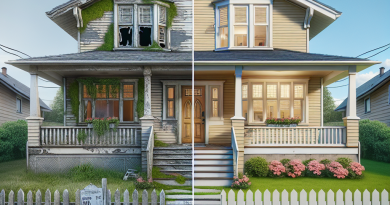Navigating Real Estate Renovation Building Codes: What You Need to Know
Navigating Real Estate Renovation Building Codes: What You Need to Know
Renovating a property can be an exciting and financially rewarding venture, but it’s important to understand and comply with building codes to ensure that the project is safe, legal, and successful. Building codes are regulations that set minimum standards for the design, construction, and maintenance of buildings to protect the health, safety, and welfare of occupants. Navigating these codes can be complex, but with the right knowledge and guidance, you can ensure that your renovation project is a success.
Understanding Local Building Codes
Before you begin any renovation project, it’s essential to familiarize yourself with the building codes in your area. Building codes can vary significantly from one municipality to another, so it’s crucial to research the specific requirements that apply to your location. Contact your local building department or visit their website to access information on applicable codes, permits, and regulations.
Working with a Professional
If you’re not familiar with building codes or are unsure about how to proceed, consider working with a professional contractor or architect who has experience in renovation projects. These professionals can help you navigate the complex world of building codes and ensure that your project complies with all necessary regulations. They can also assist in obtaining the required permits and approvals from the local building department.
Obtaining Permits
Permits are legal documents that grant permission to carry out specific construction or renovation work on a property. In most cases, permits are required for projects that involve structural changes, electrical or plumbing work, or alterations to the building’s footprint. Applying for permits is typically a straightforward process that involves submitting detailed plans and specifications for the proposed work to the local building department.
Common Building Code Requirements
There are several key building code requirements that you should be aware of when planning a renovation project:
1. Structural Integrity: Building codes specify minimum standards for the structural integrity of a property to ensure that it can safely support its own weight and resist environmental forces such as wind and earthquakes. Renovation projects that involve structural changes, such as removing walls or adding new rooms, must comply with these standards.
2. Electrical Systems: Building codes require that electrical systems meet safety standards to prevent electrical fires and shocks. When renovating a property, ensure that any electrical work is performed by a licensed electrician and complies with local codes.
3. Plumbing Systems: Building codes also regulate the design and installation of plumbing systems to ensure that they function properly and do not pose a health or safety risk to occupants. If your renovation project involves plumbing work, be sure to hire a licensed plumber and follow local regulations.
4. Accessibility: Building codes specify requirements for accessibility to ensure that properties are usable by people with disabilities. Renovation projects must comply with these accessibility standards, which may include features such as wheelchair ramps, widened doorways, and accessible bathrooms.
5. Fire Safety: Building codes include regulations for fire safety to prevent the spread of fires and protect occupants in the event of an emergency. Renovation projects must incorporate fire-resistant materials, smoke detectors, and fire exits to comply with these standards.
Consequences of Non-Compliance
Failing to comply with building codes can have serious consequences, including fines, delays, and even legal action. If a property does not meet building code requirements, the local building department can issue a stop-work order, requiring the project to be halted until corrections are made. In some cases, non-compliance may also result in the property being deemed unsafe or uninhabitable.
In conclusion, navigating real estate renovation building codes is a critical aspect of any renovation project. By understanding local building codes, working with professionals, obtaining permits, and complying with key requirements, you can ensure that your renovation project is successful, safe, and legal. Remember that building codes are in place to protect the health, safety, and welfare of occupants, so it’s essential to prioritize compliance throughout the renovation process.






